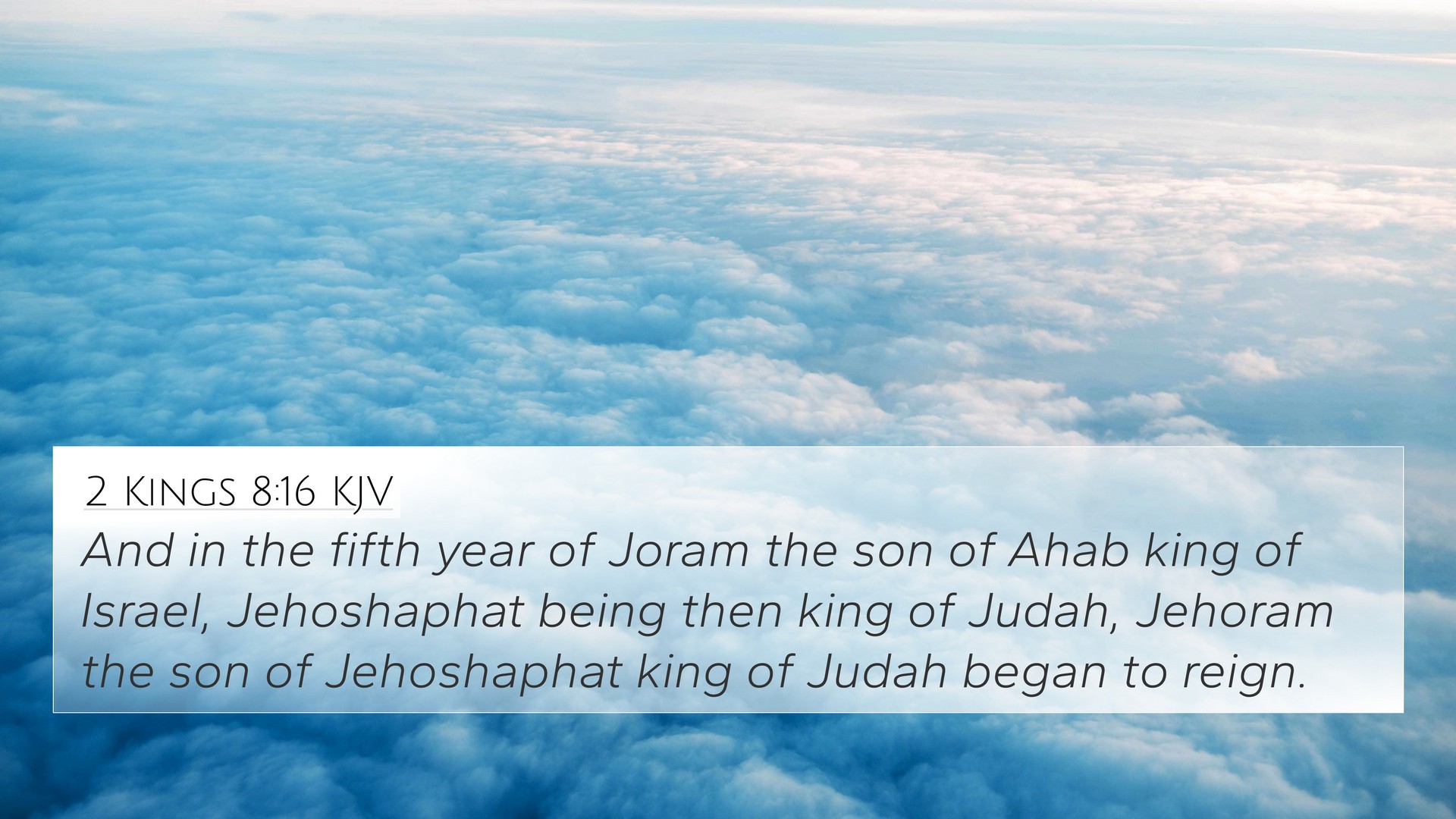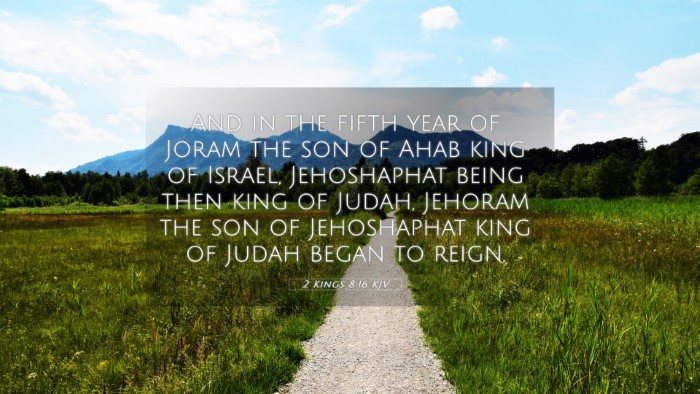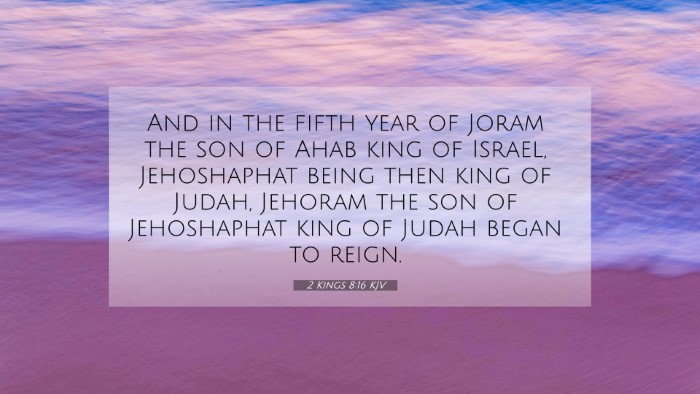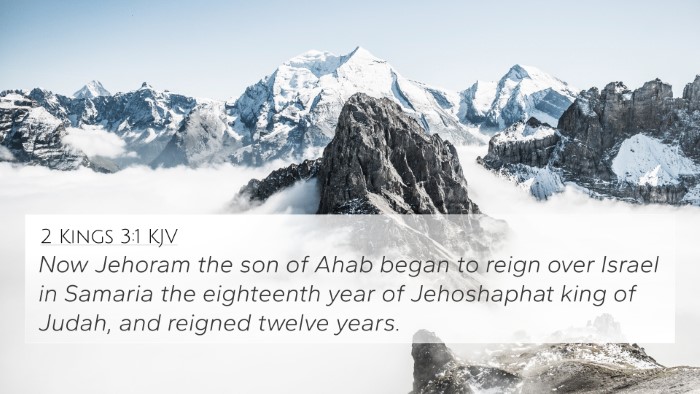Understanding 2 Kings 8:16
Verse Reference: 2 Kings 8:16 - "In the fifth year of Joram the son of Ahab king of Israel, Jehoshaphat being then king of Judah, Jehoram the son of Jehoshaphat king of Judah began to reign."
Overview of the Verse
This verse marks a significant transition in the history of Judah and Israel. It introduces the timeline of the reign of Jehoram, the son of Jehoshaphat, against the backdrop of continued hostilities between Israel and Judah. The mention of specific time markers highlights the historical context necessary for understanding the unfolding events.
Commentary Insights
Drawing from the insights of notable public domain commentaries, several themes emerge:
- Historical Context: The reference to Joram of Israel and Jehoshaphat of Judah provides crucial context for the political landscape during Jehoram's ascension to the throne. Matthew Henry notes that this period was marked by complicated political alliances and struggles.
- God’s Sovereignty: Albert Barnes emphasizes that despite the tumultuous politics, God’s plan was being worked out in history. The succession of kings, whether good or wicked, does not thwart God’s purposes.
- Judah's Leadership: Adam Clarke points out that Jehoram’s reign signifies a shift; the leadership of Judah was influenced by the wickedness of Israel which often led them astray.
- Divine Judgment: Further scholarly insights suggest that this period is reflective of God's judgment upon Israel, as evidenced by the choices of its leaders, establishing a pattern seen throughout scripture in times of national disobedience.
Related Bible Cross-References
This verse invites connections with several others in the scriptures, demonstrating the interlinking of biblical narratives:
- 1 Kings 22:51-53 - Details the reign of Ahaziah and the continuity of the struggles between the kings of Israel and Judah.
- 2 Chronicles 21:1-7 - Offers insight into Jehoram's character and actions, providing a broader context of his reign.
- 1 Kings 16:23-28 - Discusses the lineage of Ahab and the resulting influences on the kingdom of Israel.
- 2 Kings 3:1-3 - Further develops the reign of Joram of Israel and his relationship with Judah.
- 2 Kings 1:17 - Adds to the narrative of King Joram’s predecessors and the impact of their decisions.
- 2 Chronicles 22:1-9 - Examines the consequences of Jehoram’s wickedness in Israel and Judah.
- Micah 6:16 - Prophetic reflections on the walking in the statutes of Omri, illustrating the spiritual ramifications of leadership.
Connections Between Bible Verses
The verse in 2 Kings serves as a hub for further exploration of themes such as:
- How leadership qualities influence a nation's spiritual health.
- The consequences of forsaking covenant obedience as depicted throughout the historical texts.
- The role of prophetic voices in guiding nations during turbulent times.
- The cyclical patterns of repentance and rebellion seen throughout scripture.
Thematic Bible Verse Connections
Examining the overarching themes contained within the verse and related cross-references helps establish a deeper understanding:
- Judgement and Mercy: The themes of divine judgment present in Jehoram’s reign echo throughout scripture, reminding us of the serious spiritual implications of leadership.
- God’s Covenant with Israel: The ongoing call to return to God amidst their failures and strayings from His commandments highlights the continuous thread of God’s mercy.
- Inter-Biblical Dialogue: The information about Jehoram aligns with prophetic texts which challenge kings to uphold God’s laws (e.g., Isaiah and Jeremiah).
Tools for Bible Cross-Referencing
For those studying these themes, utilizing tools such as:
- Bible Concordance: A valuable resource for locating themes and verses.
- Bible Cross-Reference Guide: Essential for connecting scripture across the testaments.
- Cross-reference Bible Study: Methods that incorporate relevant scriptures for deeper insight.
Conclusion
2 Kings 8:16 sets the stage for understanding the reign of Jehoram and its implications, emphasizing God’s sovereignty amidst political turmoil. By establishing connections through cross-referencing biblical texts, readers gain a greater appreciation of the intertwined nature of scripture.






